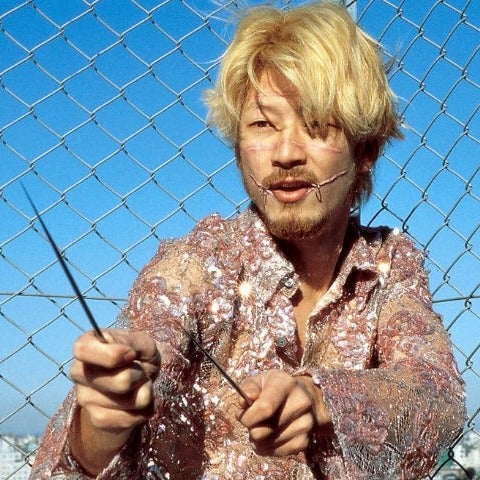Until recently the idea of death didn’t feel real. I’ve been fortunate enough to not have to think too much about death, but through the music of Phil Elverum, the musician behind both The Microphones and Mount Eerie, I’ve learned to confront that disconnect from reality. Death was a topic that came up throughout Elverum’s music, but now it’s a tyrannical presence, dominating every thought.
Last year, Elverum’s wife Geneviève died after a battle with pancreatic cancer. On his latest album, A Crow Looked At Me, Elverum addresses this head-on. “Death is real,” he opens the album. Recorded in the room where she passed away, the tracks on the album lay his feelings bare, accompanied by little more than gentle strums of a guitar and the occasional use of bass and piano. Elverum’s grieving leaves little to the imagination. The usual atmospheric, metaphor-laden lyrics of his previous output are absent. Like death itself, A Crow Looked At Me is stark and heavy.
Elverum painstakingly describes the moment death became real for him on “Swims,” singing, “I can't get the image out of my head / Of when I held you right there / And watched you die.” He continues, “We are all always so close to not existing at all.” Until it inevitably enters life, death is a foreign, profound concept. The thought of someone ceasing to physically exist is hard to come to terms with until it’s reality, and that’s something that Elverum spends the album realizing. “Death is real,” he repeats.
When he previously explored death, it wasn’t rooted in reality, and this is something he addresses. “Conceptual emptiness was cool to talk about back before I knew my way around these hospitals,” he sings on “Emptiness pt. 2.” As a self-critical tribute to Geneviève’s life, the album documents the grieving process, and it’s both painful and beautiful.
“You have been dead eleven days,” Elverum sings on the album’s second track, “Seaweed.” Every detail about the days before and the days that follow is shared. Elverum goes as far to date the songs at times, as if writing an entry in a diary. The passing of time comes up frequently as absence sinks in. The record sounds as if he’s in the same room, discussing what it’s like to raise a daughter without a mother, to continue existing as another existence ends.
Elverum shares everything except the name of his and Geneviève’s daughter, separating A Crow Looked At Me from everything he’s done before as artist. Previously distant, Elverum strips away any semblance of privacy in the pursuit of overcoming immense despair. For how specific the album is to his experience with death, it is deeply affecting beyond sympathy.
When Elverum announced the album he explained that it could be titled “Death Is Real,” and after listening to the whole thing it’s obvious why. He doesn’t just talk about death, he talks about how it affects us as humans in the ways we don’t expect. Until this album came along, death wasn’t something I could fully comprehend, despite having faced it previously. Through Elverum’s lyrics, its looming omnipresence becomes less opaque.
“Someone’s there and then they’re not,” Elverum sings plainly on the opening track “Real Death.” It’s not profound anymore, it’s just there.
A Crow Looked At Me is devastating in its direct nature, exposing each moment leading up to and following death. The whole album is an astonishing piece of work about an ugly, complicated reality. Elverum faces up to his grieving process, lamenting that death is “not for making into art.” He adds, “When real death enters the house, all poetry is dumb.”
The poetic lyricism of his previous output doesn’t fully escape A Crow Looked At Me, it’s just that there’s a forwardness his music hasn’t possessed before. The closing lines of “Seaweed” are beautiful, despite how painful it is to hear Elverum sing them. “I brought a chair from home / I'm leaving it on the hill / Facing west and north / And I poured out your ashes on it / I guess so you can watch the sunset / But the truth is I don't think of that dust as you / You are the sunset.”
Even though the album sees him singling in on every detail regarding death, it’s ultimately a piece of music about lingering love. Even when he’s singing about Geneviève’s absence, he speaks as if she’s there to hear what he has to say. Canceled plans and overflowing garbage go from mundane to heartbreaking. In his statement about why he chose to release the album, he said, “I make these songs and put them out into the world just to multiply my voice saying that I love her. I want it known.”
As the album reaches its end, Elverum needn’t remind himself again that death is real. Instead, he looks to focus on the memory of who it took. However much her last moments scarred him, it’s not what comes to define memories of her.
It’s not always an easy album to listen to, but it is absolutely necessary. “If you are a person who says ‘passed away’ instead of ‘died’ you might be uncomfortable and unhappy,” he expressed in the announcement of his first live shows in two years. A Crow Looked At Me is unflinching in its depiction of mourning. Elverum is a remarkable songwriter, but he said it himself that this is “barely music.” Instead, this is sorrow shared.

